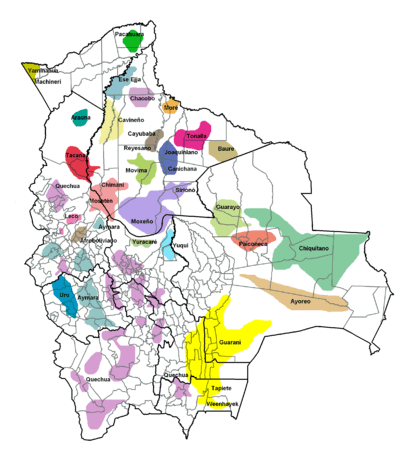Languages of Bolivia
| Part of a series on the |
| Culture of Bolivia |
|---|
 |
| History |
| People |
|
|
Festivals |
|
Art
|
|
|
Music and performing arts |
|
|
Monuments
|
|
Symbols |
|
The languages of Bolivia include Spanish; several dozen indigenous languages, most prominently Aymara, Quechua, Chiquitano and Tupi Guaraní; Bolivian Sign Language (closely related to American Sign Language); and language of immigrants such as Plautdietsch. Indigenous languages and Spanish are official languages of the state according to the 2009 Constitution. The constitution says that all indigenous languages are official, listing 36 specific languages, of which some are extinct. Spanish and Quechua are spoken primarily in the Andes region; Aymara is mainly spoken in the Altiplano around Lake Titicaca, Chiquitano is spoken in the central part of Santa Cruz and Guaraní in the southeast on the border with Paraguay.
List of official languages

.png)
The following languages are listed as official languages in the Constitution of Bolivia.[1]
- Castilian (Spanish) and,
- Aymara
- Araona
- Baure
- Bésiro
- Canichana (extinct)
- Cavineño
- Cayubaba (extinct)
- Chácobo
- Chimán
- Ese Ejja
- Guaraní
- Guarasu'we (extinct)
- Guarayu
- Itonama
- Leco
- Machajuyai-Kallawaya
- Machineri
- Maropa
- Mojeño-Ignaciano
- Mojeño-Trinitario
- Moré
- Mosetén
- Movima
- Pacawara
- Puquina (extinct 18th century)
- Quechua
- Sirionó
- Tacana
- Tapieté
- Toromona
- Uru-Chipaya (not a single language; only Chipaya is still spoken)
- Weenhayek
- Yaminawa
- Yuki
- Yuracaré
- Zamuco
Demographics
| Language | people | percent |
|---|---|---|
| Quechua | 2,281,198 | 25.08% |
| Aymara | 1,525,321 | 16.77% |
| Guaraní | 62,575 | 0.69% |
| Other native | 49,432 | 0.54% |
| All native | 3,918,526 | 43.09% |
| Only native | 960,491 | 10.56% |
| Native and Spanish | 2,739,407 | 30.12% |
| Only Spanish | 4,082,219 | 44.89% |
| Spanish | 6,821,626 | 75.01% |
| Foreign | 250,754 | 2.76% |
| Spanish and foreign | 4,115,751 | 45.25% |
Official status
The Bolivian government and the departmental governments are required to use at least two languages in their operation, one being Spanish, and the other being selected according to the circumstances and the needs of the territory in question. These requirements appear in Article 234 of the 2009 Constitution and the General Law of Linguistic Rights and Policies (Law 269 of August 2, 2012); the law provided a three-year deadline to government functionaries, although there was no immediate punishment for officials who failed to comply.[2] Departmental and municipal autonomous governments are required to use the languages of their territory, always including Spanish.[3]
Following the National Education Reform of 1994, all thirty indigenous languages were introduced alongside Spanish in the country's schools.[4] However, many schools did not implement the reforms, especially urban schools.
Bolivia's National Hymn has been translated into six indigenous languages: Aymara, Bésiro-Chiquitano, Guaraní, Guarayu, Quechua, and Mojeño-Trinitario.[5]
Languages without official status
Standard German is spoken by 160,000 of whom about 70,000 are Mennonites in Santa Cruz Department. These Mennonites speak Plautdietsch, a German dialect, as everyday language but use Standard German for reading and writing and as formal language e.g. in church.[6]
See also
References
- ↑ Political Constitution of the State - Article 5
- ↑ "Funcionarios deben hablar una lengua originaria desde agosto". Página Siete. 2015-07-29. Retrieved 2018-03-21.
- ↑ Nueva Constitución Política Del Estado, Aprobada en grande, detalle y revisión. December 2007, article 5.
- ↑ Hornberger, Nancy. 1997. Language policy, language education, language rights: Indigenous, immigrant, and international perspectives. Language in Society 27:443. Retrieved on April 28, 2009.
- ↑ Cuevas, Aleja (August 9, 2017). "6 de 34 pueblos logran traducir el Himno Nacional - La Razón". La Razón (in Spanish). Retrieved 2018-03-21.
- ↑ Ethnologue: Paraguay
External links
- Lenguas de Bolivia (online edition)